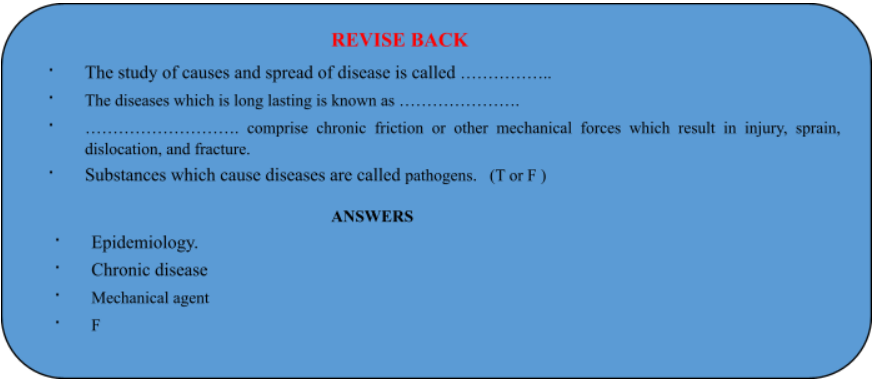Disease
Human Health And Diseases of Class 10
The term diseases (des-away, aise-ease) refers to derangement of health or any bodily disorder, or abnormality which does not let the body function properlyA disease is a condition of the body or a part of it in which functions are disturbed. Disease may also be defined as morphological (structural), physiological (functional) or psychological disturbance in the body or body parts caused by external agencies which may be non-parasitic e.g. deficiency of nutrients or may be parasitic e.g.caused by viruses, bacteria, fungi, etc. The term disease means disease or discomfort or without ease. In short, it can be defined as "Disease is disorder of body."
Disease can be caused by intrinsic factors i.e. factors within the body and extrinsic factors i.e. factors outside the body. Diseases affect our health by disease-causing organisms, malfunctioning of the vital body organs, deficiency of nutrients or psychological reasons.Substances which cause diseases are called agents. Biological agents causing diseases (viruses, bacteria, fungi, protozoa, worms etc.) are called pathogens.Time interval between the entry of pathogen and appearance of symptoms is called incubation period. The study of causes and spread of disease is called Epidemiology. Study of the cause of disease is called Etiology.
Distinction Between Healthy and Disease Free:
Differences Between Healthy and Disease Free |
|
|
Healthy |
Disease Free |
|
1. It is the state of physical, mental andsocial well being |
1. It is the state of absence of any bodydiscomfort. |
|
2. It depends upon the person and one'senvironment including society. |
2. It depends upon the person alone. |
|
3. A person can be unhealthy even in theabsence of disease. |
3. A person would be disease free in the absenceof discomfort. |
Acute and Chronic Diseases:
The manifestation of diseases are different depending upon a number of factors. One of the factors is duration of disease. On the basis of duration a serious disease can be acute or chronic.
(i) Acute disease: Acute disease is the one, which has a short duration by relatively severe course. Most people with acute illness can expect to return to normal health. A case of cough and common cold is an example of an acute illness, which lasts only for few days. Afterwards the patient becomes well without any bad effect, loss of weight, and feeling of tiredness.
(ii) Chronic disease: Chronic disease is the one, which is long lasting, is usually slow to develop, often having a major effect on health, reducing the person's ability to do work efficiently, learning in school or doing work. The patient will also loose weight and feel tired all the time. Examples of chronic diseases include tuberculosis, diabetes, asthma, hypertension, kidney disease, depression, etc. In these diseases, we can develop a treatment plan to manage symptoms and prevent complications with the help of doctor.
Causes of Diseases: The various causes of diseases are
Agent is the organism or force or substance whose presence or lack or excess causes disease hence classified as :
- Biological agent : Viruses, bacteria, fungi, protozoan, helminthes, insects etc. These are also called Pathogens (Gr. pathos means disease; genesis means producing). These are those microorganisms which when successfully infect the human body, multiply and produce toxins in incubation period which interfere with the normal functioning of the body and cause a disease.
- Nutrient agents : These comprise food component like high or low levels of minerals, proteins, carbohydrates, lipids, vitamins and water results into disease.
- Chemical agent : They are divided into two types :
- Endogenous Chemical Agents :These are formed in the body itself and include hormones enzyme and uric acid. Fluctuation in the level of these components causes disease.
- Exogenous Chemical Agents :These enter the body from outside by inhalation, ingestion or inoculation. Pollutants (fumes, gases, dusts, metals) and allergens (spores, pollen) are examples.
- Mechanical agent : These comprise chronic friction or other mechanical forces which result in injury, sprain, dislocation, and fracture.
- Physical agent : Light, heat, electricity, radiation, sound etc. are also the vital cause of diseases these days.










